Phoenix
MK Cargo Rises
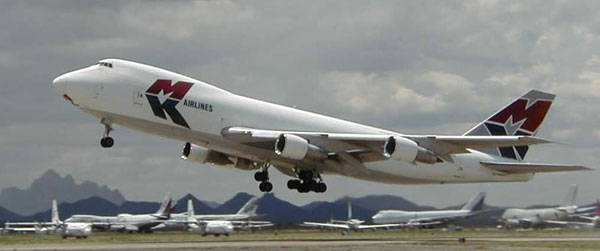
Like the Phoenix, British
air cargo operator MK Airlines Ltd. rose up from the ashes and resumed
flights today (Friday May 20).
Air Cargo News FlyingTypers
received confirmation of this from a high-ranking manager of Swiss logistics
company Panalpina. Background of the carrier's second life after MK had
grounded their fleet some days ago (ACN FT reported exclusively)
will be given Monday or Tuesday next week pending on the approval of the
new majority owner.
According to sources close to MK the savior
of the carrier is a British-based investor that secured the cargo airline's
take-off by injecting fresh money.
Founder and CEO Mike Kruger will keep his
seat at the carrier's top management ranks, ACN FT learned.
Newly-born MK will mostly serve routes within
Africa, between Europe and Africa as well as Far East and Europe. "Although
they have an aging fleet of eight B747-200Fs and even an old kerosene
consuming DC-8F they can be
profitable on the long run if they streamline some processes and become
somewhat more efficient," Panalpina's executive said.
"In a way they have the spirit of old
German Cargo, the forerunner of Lufthansa Cargo," he added.
One of the first flights of 'Phoenix' MK
goes from Urumchi in Northwest China to Parchim airport in Germany and
on to Luxembourg this Sunday.
This has been announced by both Panalpina
and Jonathan Pang, chairman of Chinese LinkGlobal Logistics.
Meanwhile LinkGlobal and Australian asset
manager Goodman announced at the commercial property “Expansion
Fair” held last week June 18-19 in Hamburg, Germany that they teamed
up to enhance Parchim airport by building logistics facilities and bringing
in cargo traffic.
This includes the payment of €13 million
Euros to the owner of the airport, the county of Parchim in Northeast
Germany.
After the county receives the money the
airport will officially be transferred from public ownership to the property
of Chinese LinkGlobal Logistics.
Heiner Siegmund
Security Headlines IATA
BKK
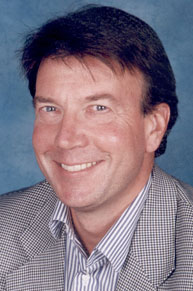 When
the issue is air cargo security, it might not be a bad thing for the
industry to view the topic as those outside the commercial aviation
industry see it. When
the issue is air cargo security, it might not be a bad thing for the
industry to view the topic as those outside the commercial aviation
industry see it.
Truth is that many people in every day
life believe that air cargo on airplanes is vulnerable.
While a good portion of that notion is
based on misinformation, like it or not in 2008, the air cargo industry
is huge with complex supply chains as freight forwarders, integrators
and air carriers strive to open new revenue streams and grow market
share.in an increasingly competitive, low yield, environment.
In Bangkok September 17-19 at IATA’s
Fourth Cargo Claims & Loss Conference air cargo security will be
front and center as IATA Head of Cargo Security, John Edwards speaks.
Interestingly the last CC&L gathering
was held just last February 2007, so we suppose the fact that the group
is again meeting is clear indication that finally the fate of developing
standards and broad based industry understanding through enlightened
security discussion will not be relegated to some session-empty venue
at a otherwise mostly commercial industry trade show somewhere.
John Edwards puts it this way:
“Many industry stakeholders are
familiar with politically driven proposals to screen 100% of cargo prior
to its uplift on a commercial flight. There is lots of confusion about
what this means. For example, does it include known shippers or not?
If not, then “most experts agree that, even if this is desirable
(and many believe it is not) there is, for competent security, no silver
bullet.
The case for harmonization of requirements,
which are, so far as is practical, internationally recognized and accepted,
appears to be strong.
“We know from experience that it
is unrealistic to target harmonization of complete national programs.
“The cultural, political and practical
obstacles are simply too large.
“But we also know, from EU initiatives
and from various other rulemaking, that when the industry speaks with
one voice, it has a much better chance to be heard.
“Collectively the industry has the
strength and influence to enhance regulatory thinking and development,
and it must exploit this.
“Harmonization historically has
primarily been regional and focused on detailed security program requirements.
“They have not been based on a cohesive
industry harmonization strategy nor adequately coordinated.
To offer a solution, IATA Cargo is developing
a Secure Freight Program, which aims to establish global supply chain
standards for aviation security and crime prevention. It will be based
on a quality assurance program and audit, for which we hope to gain
recognition from regulators and stakeholders alike. “At the last
CC&L we advanced thinking and cooperation in several areas.
“In Bangkok we expect to update
our progress and continue to seek common ground for even more dramatic
advancement in the future.”
He points to this from the U.S. Congressional
Research Service released in February 2008.
"It is estimated that direct losses
due to cargo theft across all transportation modes total between $10
and $30 billion annually in the United States.
“The large range in this estimate
reflects the fact that cargo theft has not been a specific crime category
and therefore reliable statistics are unavailable."
Later the report continues, "In addition
to theft, smuggling is a problem for air cargo security.
“Smuggling operations are often
linked to organized crime, and may provide support for terrorist activities.”
Likewise TAPA, The Transported Asset Protection
Association brings forward some numbers worth examining.
During 2005, 21 incidents with a loss
value of €9,070,069 Euros were reported.
By 2006 that number had risen to 33 incidents
with a loss value of €4,773.
“Secure Freight is a developing
concept to address remaining vulnerabilities from terrorism and crime
in a collaborative effort to defeat the common enemy.
“The air cargo industry has a compelling
business motive to protect its longevity –by ensuring it is a
fast, reliable, secure means of moving freight globally –and a
moral duty to safeguard human life.
“It must tackle head-on the remaining
vulnerabilities within cargo security and address crime.
“There is an expectation that the
industry will take ownership of its own aviation security issues.
“What is needed is a global voluntary
supply chain security quality assurance program intended to address
vulnerabilities.
“Also needed are effective regulatory
programs that would be universally recognized “We want to establish
a Secure Freight Steering Group and Work Groups to develop specific
program elements and importantly, ensure the views of industry stakeholders
are properly considered.”
Geoffrey
|
|
 Air
Cargo Club Deutschland (ACD), the Frankfurt pioneer organization now 45
years in service, ended the first half of the year with a June barbecue. Air
Cargo Club Deutschland (ACD), the Frankfurt pioneer organization now 45
years in service, ended the first half of the year with a June barbecue.
CEO Carsten Spohr showed up for the event
that also turned into something of a roast as the erstwhile Spohr mastered
the longest question & answer session in memory.
ACD members and guests–whether representing
a shipper, a logistics provider, an airline or an airport, here and everywhere
else, are deeply troubled by the astronomic prices for jet fuel, the recession
in some regions of the global market and security and other challenges
as air cargo marks the mid point of 2008. The guest speaker delivered
a “Status Quo-Outlook?” presentation that certainly went all
the way to assure the audience that Lufthansa Cargo leadership is aware
of and addressing a host of market-driven situations with an eye to prevailing.
Spohr spoke to concerns amongst some of
the forwarders about the special nature of that Lufthansa/DHL joint venture
recently announced and staffed with aircraft called “AeroLogic.”
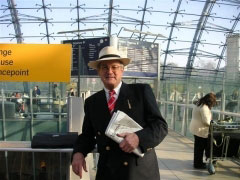 Carsten
Spohr said: Carsten
Spohr said:
“Look, Deutsche Post/ DHL is our biggest
account.
“Sometimes that adds up to the need
for capacity that as a scheduled carrier we cannot provide at a moment’s
notice.
“In any case the set up was driven
in an open bid fashion.
“Cargolux and Emirates bid for this
arrangement that might not have been called AeroLogic but certainly would
have carried a similar title.
“We feel that it is better Lufthansa
Cargo is the partner rather than one of the others.”
In Mr. Spohr’s presentation, the high
service quality standard was described including security elements and
the importance given to the entire ground operation.
“Lufthansa Cargo believes that the
quality difference among cargo carriers is really performance on the ground
and not in the air.”
What was impressive here, as the session
continued, was that today in 2008 the highest level of management of an
airline puts its present status and future plans and features out for
all to see and respond to in kind.
No topic remained untouched as Carsten Spohr
spoke.
The thought occurred that this eloquent,
sharp and winning personality, out making friends for cargo might also
be raising options for his future at Lufthansa Group.
Guenter Mosler
How HI Is Hamburg?
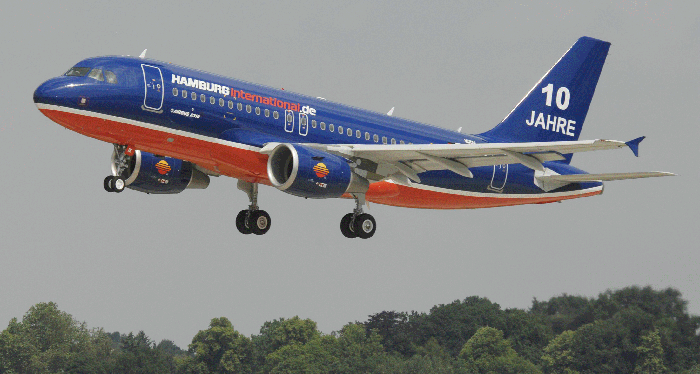
The livery is a birthday present from 10
year-old leisure carrier Hamburg International (HI) to its hometown of
Hamburg. HI presented a brand new Airbus A319 all in red and blue—the
traditional colors of the 1200-year old Hanseatic metropolis in Northern
Germany. "This Airbus not only visualizes our proud history of 10
years at the tail ("10 Jahre") but is moreover an ambassador
for both our company and the city of Hamburg," remarked commercial
director Ralph Ullman of HI during the presentation of the new craft at
the Airbus plant in Hamburg where it was built. In the coming months the
A319 will land at all 16 German airports HI is presently serving and bring
passengers from there to destinations around the Mediterranean Sea, the
Red Sea and the Canary Isles.
The Hamburg-based Airbus production plant
just announced the first components for the future A320 China-made aircraft
will leave the port of Hamburg on June 24 by ocean vessel. They will be
shipped to Tianjin near Beijing where the European plane maker is presently
building an assembly plant for the A320, the first ever outside France
and Germany.
Heiner Siegmund
Supersonic
Business On Tap
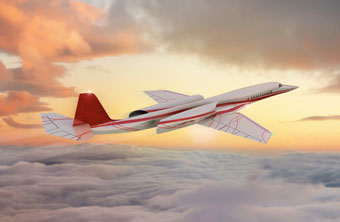
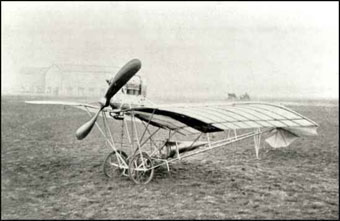
Wing, tail and empennage effects on proposed business
SST pictured here are reminiscent of the dainty, butterfly-like 1910
Demoiselle monoplane that famed aviation pioneer Santos Dumont flew
at speed races and around the Eiffel Tower at 55 mph., thrilling millions. |
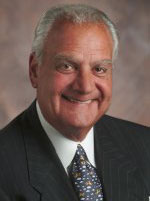 Anybody
who thinks aviation may just go away what with high fuel costs should
take a reality check from Reno, Nevada-based USA corporation Aerion that
has been accepting orders for the Aerion supersonic business jet. Anybody
who thinks aviation may just go away what with high fuel costs should
take a reality check from Reno, Nevada-based USA corporation Aerion that
has been accepting orders for the Aerion supersonic business jet.
As you read this, Aerion says it has received
more than 40 letters of intent backed up by refundable deposits of $250,000.
At a price of $80 million per aircraft,
the total backlog stands at more than $3 billion.
“Just two and a half years ago our
market research indicated a market for 300 supersonic jets over 10 years,”
noted Aerion Vice Chairman Brian Barents, “but that survey did not
even include demand from countries such as India, China and Russia.
“If anything, we have underestimated
global demand.”
Barents pointed to five orders secured by
marketing agent ExecuJet in India alone as an indication of an emerging
market demand.
Aerion says it has also secured orders in
Pakistan, The Middle East, Europe, North America and South America.
Barents pointed to growing demand at the
top of the business jet market.
A supersonic jet is now not far in price
from subsonic alternatives, which is giving more companies an incentive
to consider the Aerion jet.
Aerion says it expects to certify the supersonic
jet as planned in 2014.
www.aerioncorp.com
|






 Anybody
who thinks aviation may just go away what with high fuel costs should
take a reality check from Reno, Nevada-based USA corporation Aerion that
has been accepting orders for the Aerion supersonic business jet.
Anybody
who thinks aviation may just go away what with high fuel costs should
take a reality check from Reno, Nevada-based USA corporation Aerion that
has been accepting orders for the Aerion supersonic business jet.